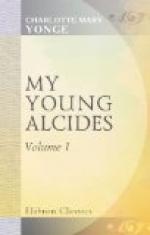So it went on hour after hour, evening closing into night, the long, long night brightening at last into day, and still the fever raged, and the fits of delirious agony came on, as though every fiend that had ever tempted him were assailing him now. Yet still he had the power to grasp the Cross when it was held to him, and speak the words, “Christ has conquered,” and his ears were open to the prayer, “By Thy Cross and Passion, by Thine Agony and Bloody Sweat, good Lord deliver us!”—the prayer that Ben prayed like Moses at Rephidim. Time came and went, the Northchester physician came and said he might be saved, if the eruption could only be brought out, but he feared that it had been thrown inwards, so that nothing would avail; but of all this Harold knew nothing, he was only in that seething brain, whose former injury now added to the danger, living over again all his former life, as those who knew it could trace in the choked and broken words. Yet, as the doctors averred, that the conscience and the will should not be mastered by the delirium was most unusual, and proved the extraordinary force of his character and resolution, even though the conflict was evidently a great addition to his sufferings.
Worst of all was the deadly strife, when with darkness came the old horror of being pursued by hell hounds, driven on by Meg and the rival he had killed—nay, once it was even by his little children. Then he turned even from the Cross in agony. “I cannot! See there! They will not let me!” and he would have thrown himself from his bed, taking the hands that held him for the dogs’ fangs. And yet even then a command rather than a prayer from the priest reached his ears. He wrestled, with choking, stifling breath, as though with a weight on his chest, grappling with his hands as if the dog were at his throat; but at last he uttered those words once more, “Christ has conquered;” then with a gasp, as from a freed breast, for his strength was going fast, fell back in a kind of swoon. Yes, he was delivered from the power of the dog, for after that, when he woke, it was in a different mood. He knew Ben, but he thought he had little Ambrose sitting on his pillow; held his arm as if his baby were in it, and talked to them smiling and tenderly, as if glad they had come to him, and he were enjoying their caresses, their brightness, and beauty. Nor did the peace pass away. He was so quiet that all hoped except George Yolland, who knew the mischief had become irreparable; and though he never was actually sensible, the borderland was haunted no more with images of evil or of terror, but with the fair visions fit for “him that overcometh.” Once they thought he fancied he was showing his children to Viola or to me. Once, when Dermot’s face came before him, he recurred to some of the words used in the struggle about Viola.
“I don’t deserve her. Good things are not for me. All will be made pure there.”




